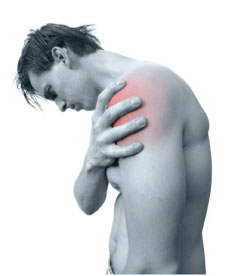 Normal daily activities or sports can result in a range of common injuries to the shoulder, they most commonly occur in overhead activities and usually when other areas such as the upper back or hips aren’t moving or functioning as well as they could.
Normal daily activities or sports can result in a range of common injuries to the shoulder, they most commonly occur in overhead activities and usually when other areas such as the upper back or hips aren’t moving or functioning as well as they could.
Racquet sports such as squash and tennis or pitching/bowling sports such as cricket and baseball all have really high rates of shoulder injuries but in an older population we see many of the same sorts of shoulder problems with home maintenance and renovation work .
Many of the most common shoulder problems relate to a group of small muscles that are critical in supporting the shoulder joint. The rotator cuff are a group of muscles and tendons that cross the top and back of the shoulder to form a sleeve or cuff that helps control joint movements. They attach at various points at the top of the humerus, the bone at the top of the arm that forms part of the shoulder joint. The cuff is made up of four muscles but most commonly the supraspinatus tendon is affected.
The biceps tendon also crosses the front of the shoulder joint. Any activity that requires repetitive overhead movements or sustained postures can result in inflammation and irritation of these tendons which produces shoulder pain due to tendinitis.
Some of the more common shoulder problems include:
Impingement Syndrome – When local tendons become pinched in the joint due to narrowing of the joint space; this is commonly due to either inflammation or arthritic changes.
Bursitis – Inflammation of the bursa (fluid-filled sacs) around the shoulder that normally are present to act as a mechanical lubricant or shock absorber.
Muscle Strain – Can occur in any of the shoulder muscles such as the upper trapezius or in the deltoid muscle at the side of the shoulder.
If you notice pain or soreness in your shoulder following repetitive activities or sports they first step is to use a cold pack for 10 minutes 3-5 times per day to help decrease inflammation. In many cases this will help settle the issue and no further treatment is required but if this sort of soreness is recurrent and comes on regularly with activity or sport, further treatment is indicated.
Treatment Options for Shoulder Injuries
The type of osteopathy treatments or techniques required depend largely on the specific condition and examination findings you have and whether you’ve undergone surgery or not. To ensure you get back to where you need to be our Osteopaths will also ask you a heap of questions about your activities and sports in order to understand the goals of rehabilitation.
Osteopathy treatments for shoulder injuries may be composed of a combination of any of the following:
- Cold therapy (ice pack application/ice massage)
- Hot pack application
- Immobilization (splinting/bandaging)
- Transcutaneous electrical nerve stimulation (TENS)
- Soft tissue mobilisation (massage)
- Shoulder joint mobilisation
- Back and/or neck mobilisation
- Rehabilitation exercises for range of motion, flexibility, coordination, strength and conditioning
- Patient education about the particular shoulder problem, precautions and activity modification, further injury prevention
- Self-management strategies for symptoms
- Return to work or sports rehabilitation planning and advice
Osteopathic management improves outcomes and aids in the prevention of shoulder injuries.



